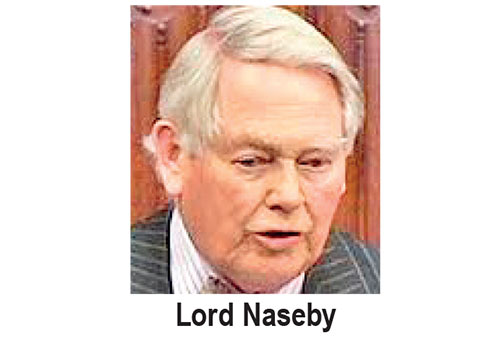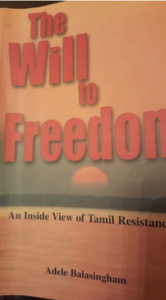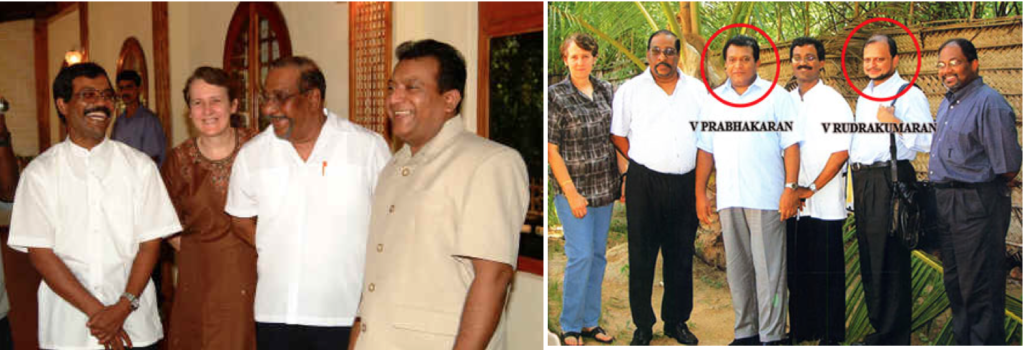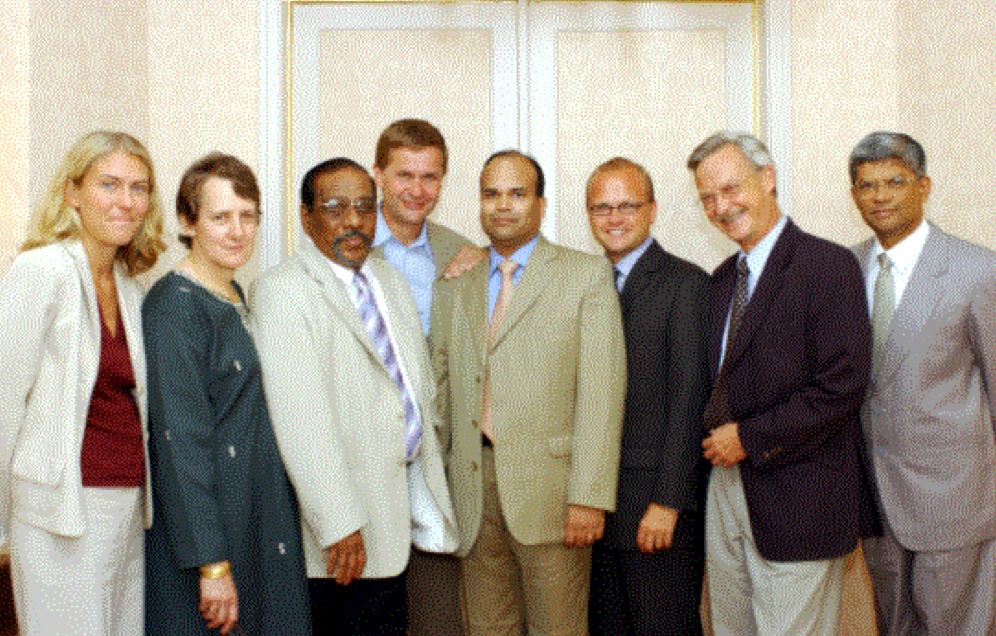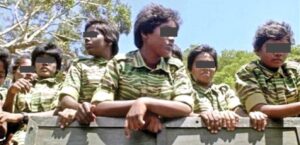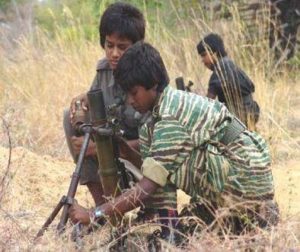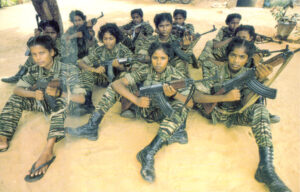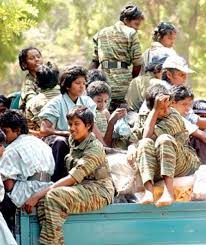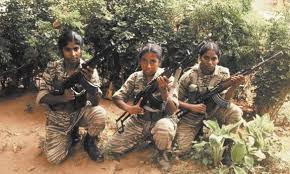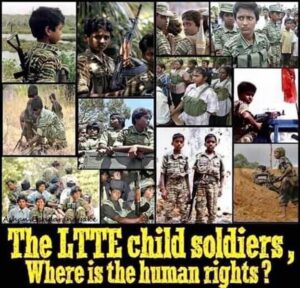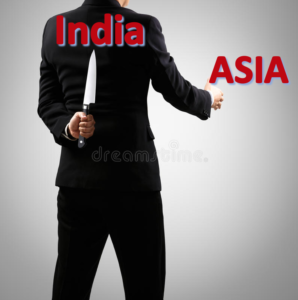Operation Vadamarachchi that encircled Prabakaran was brought to a close by Operation Poomalai by India and Prabakaran was evacuated to India by helicopter and kept until the Indo-Lanka Accord was signed and Rajiv Gandhi returned to Delhi. By rescuing Prabakaran in May 1987 India is responsible for every killing by LTTE until finally Sri Lanka’s Armed Forces eliminated Prabakaran in May 2009 though that too served India’s/QUAD interests.
Operation Vadamarachchi (Liberation) – 26 May 1987 (Phase 1) 3 June 1987 (Phase 2)
Nearly 5000 Sri Lankan troops were deployed to vest control over LTTE held areas of Jaffna using 3 brigades. By 1987, Sri Lanka’s Armed Forces were 40,000.
The decision was taken following a spate of attacks by the LTTE.
- 3 May 1986 Air Lanka flight UL512 killing 21 including 13 foreigners
- 7 May 1986 Parcel bomb at Central Telegraph Office killing 11 and injuring over 100
- 29 May 1986 bombing at Ceylon Cold Stores warehouse in Slave Island killing 9
- 17 April 1987 Aluth Oya massacre killing 127 civilians
- 21 April 1987 Pettah bus stand bombing killing 113 civilians.
- 28 May 1987 LTTE’s notorious Canada Bunker’ (2 storied building) was captured.
- 28 May 1987 – Uddupidy & Nelliady was captured by Sri Lanka troops
- 31 May 1987 Vadamarachchi region was recaptured.
- 1 June 1987 – Army approached Point Pedro
- 2-4 June 1987 – Flotilla & Parippu drop
- 5 July 1987 – LTTE’s first suicide bomber – Capt Miller who drove a lorry loaded with explosives to the Nelliady army camp in Vadamarachchi.
- 21 July 1987 – India sends 6 helicopters to transport Prabakaran, his wife & family to Delhi Ashok Hotel. He was given no access to his men
- 29 July 1987 – Indo-Lanka Accord
- 30 July 1987 – IPKF landed claiming ‘we will have Prabakaran in our custody within 72 hours’.Eventually, IPKF ended up gunning down Tamils, raping Tamil women, attacking Sinhalese villages until IPKF was asked to leave Sri Lanka by March 1990.
- 2 Aug 1987 – Prabakaran flown back to Jaffna ONLY after PM Rajiv returned to Delhi from Colombo after signing indo-Lanka Accord
The 2ndphase commenced on 3 June 1987 heading to Achchuveli to capture Jaffna. This was when India sent a flotilla of ships but the Sri Lankan Navy threatened to open fire if Sri Lanka’s territorial waters were breached. India’s response was to dispatch 5 aircrafts with a threat to Sri Lanka’s envoy in Delhi.
The offensive that started on 26 May 1987 was brought to an end on 4 June 1987 because of India. India saved LTTE. India is responsible for every loss of life committed by LTTE since June 1987. Has India not prevented LTTE’s demise and capture of Prabakaran in May 1987, the conflict would not have dragged till May 2009.
According to Manoj Joshi, LTTE received about 20tonnes of explosives from RAW in June 1987.
Operation Poomalai (Eagle Mission 4) – Indian invasion of Sri Lanka
On the 4th of June 1987, India stopped the siege of Jaffna by the Sri Lankan army.
India’s Foreign Minister rang Sri Lanka’s ambassador in Delhi just 30 minutes before 5 Indian aircrafts escorted by 4 Mirage 2000s fighter aircrafts, violated Sri Lanka’s airspace and flew over Jaffna Peninsula carrying just 25tons of food on 4 June 1987. India called the intervention a ‘mercy mission’ delivering just 25tons of food! 35 Indian & international journalists were onboard the 5 flights (7 on board each plane). It was a ‘blatant violation of sovereignty’ by India. With this invasion the Vadamarachchi Operation Liberation came to an end giving a life line to LTTE. 2 days earlier on 2 June 1987 PM Rajiv Gandhi sent a flotilla by sea which the Sri Lanka Navy sent back irking India.
LTTE was openly involved in India & explains why India wished to save LTTE
- 1982 shoot-out in Pondy Bazaar
- 1983 LTTE office in Basant Nagar, Madras
- 1990 February Indian police constable killed in Ramanathapuram district
- 1990 June – 13 EPRLF leaders killed in Chennai including K Padmanabha
- these are boys who were trained by us from 1977”(Dixit, Assignment Colombo)
- It is a well-known fact that the LTTE and other Sri Lankan Militants camps were established in India ever since 1982 in tune with the policy of the Central Government at that time” Shri M. Karunanidhi, Chief Minister of Tamil Nadu (affidavit no. 187/94)
- I state that the Congress Governments under the Prime Ministership of late Smt. Indira Gandhi and late Thiru Rajiv Gandhi encouraged, trained and supported the LTTE and other Tamil Militant groups.” Shri K. Mohandas – then Dir Gen. Police (affidavit no. 64/92-JCI)
The international community stood silent regarding India’s intervention. The GoSL had no choice but to abort Operation Vadamarachchi.
No friend of Sri Lanka would train armed militants and sponsor terror resulting in killing of innocent people.
No friend of Sri Lanka would threaten our ambassador to say that opposition ‘would be met by force’
Can India expect Sri Lanka to forgive India for this role?
By saving LTTE in May 1987 – India stands guilty of every murder and war crime committed by LTTE
LTTE killed Rajiv Gandhi on 21 May 1991, India banned LTTE on 14 May 1992 – why didn’t India ban LTTE for killing innocent people? All of these lives would have been saved if India did not prevent Sri Lanka from capturing Prabakaran in Vadamarachchi in May 1997.
6 Oct 1987 – Valachchenai massacre of 40 Sinhalese travelling on train
6 Oct 1987 – Tharavi massacre of over 25 Sinhalese civilians including pregnant mothers
6 Oct 1987 – Sagarapura massacre of 27 Sinhalese villagers
7 Oct 1987 – Pottuvil massacre of 30 Sinhalese travelling on a bus
10 Oct 1987 – Ganthalawa massacre over 10 civilians killed
15 Oct 1987 – Ella Kantale massacre of 14 Sinhalese mostly women and children
16 Oct 1987 – Pulimodai massacre of 11 Sinhalese on a bus
19 Oct 1987 – Kalkudah massacre of 40 persons on a bus
9 Nov 1987 – Maradana bus bombing killing 27 civilians, and 15 shot dead by LTTE
11 Nov 1987 – Kalkuda massacre killing 7 Sinhalese selling fish
15 Dec 1987 – Devalagodella massacre killing 9 civilians in Polonnaruwa
22 Dec 1987 – Morawewa massacre killing 7 Sinhalese fishermen
31 Dec 1987 – Kaththankudi massacre killing 30 Muslims
31 Dec 1987 – Mahadivulwewa massacre killing 10 villagers
1 Jan 1988 – Kuruniyankulama massacre in Trinco killing 5 Sinhalese
2 Feb 1988 – Bogamuyana village massacre in Ampara killing 11 civilians
2 Mar 1988 – Morawewa village massacre killing 15 Sinhalese
5 Mar 1988 – Sittar, Kantale in Trinco 24 civilians killed by LTTE land mine
11 Mar 1988 – Suhadagama Anuradhapura massacre killing 19 passengers on a bus
14 Mar 1988 – Peniketiyawa, Trinco killing 28 civilians on a bus
14 Mar 1988 – Galmitiyawa, Kantale – LTTE shoot 13 Sinhalese dead
15 Mar 1988 – Kivulkade, Morawewa – LTTE kill 7 Sinhalese villagers
17 Mar 1988 – Deegawapiya, Amapara – LTTE hack to death 13 Sinhalese villagers
22 Mar 1988 – Pudukulam, Vavuniya – LTTE kill 6 Sinhalese villagers
22 Mar 1988 – Medawachchiya, Vavuniya – LTTE kill 9 Sinhalese villagers
27 Mar 1988 – Medawachchiya, 9 civilians killed in bus bomb
29 Mar 1988 – Wewalketiya – LTTE blow bus killing 9 passengers
31 Mar 1988 – Sainadamaradu – LTTE kill 10 Muslims and 7 Tamils
8 Apr 1988 – Horawapathana, LTTE kill 14 Sinhalese
30 Apr 1988 – Aranthalawa – LTTE kill 4 civilians on a bus
1 May 1988 – Sittaru, Kantale, LTTE explode land mind killing 12 Sinhalese, 9 Muslims
21 Jul 1988 – Time bomb in Bandula Hotel, Trinco killing 5 persons and wounding 15
28 July 1988 – Weli Oya LTTE kill 16 Sinhalese villagers
10 Aug 1988 – LTTE attack central camp Ampara killing 11 civilians
16 Aug 1988 – LTTE explode bomb killing 6 Sinhalees, 2 Muslims, 1 Tamil and a soldier
25 Aug 1988 – Marawila, Polonnaruwa LTTE kill 11 civilians by cutting their necks
10 Sept1988 – 16thColony, LTTE shoot 7 Sinhalese and 4 Tamils
10 Oct 1988 – LTTE attack Mahakngaskada, Medawachchiya killing 44 civilians
14 Nov 1988 – Gomarakadawela, Trinco LTTE shoo 28 Sinhalese
12 Dec 1988 – Sumedagama, Trinco LTTE kill 28 civilians
17 Jan 1989 – Maharambekulam, Vavuniya LTTE kill 9 civilians
2 Feb 1989 – Bogamuyana, Ampara LTTE kill 11 civilians
11 Feb 1989 – Dutuwewa, 37 Sinhalese killed
11 Feb 1989 – Sinhapura LTTE kill 6 Sinhalese
27 Feb 1989 – Borawewa, Polonnaruwa LTTE kill 8 Sinhalese
13 Apr 1989 – Central Road, Trinco LTTE explode bomb killing 51 civilians
17 Aug 1989 – Nochchikulam, Vavuniya 8 civilians killed
30 May 1990 – Mihindupura, Trinco LTTE kill 5 civilians
11 Jun 1990 – over 600 unarmed policemen killed in East Sri Lanka
24 July 1990 – Aralaganvila, Ampara 8 civilians hacked to death
25 July 1990 – Meeyankulam, Polonnaruwa 8 civilians hacked to death
26 Jul 1990 – Thammennawa, Ampara 19 civilians killed by LTTE
29 Jul 1990 – Samanthurai, Ampara, LTTE kill 5 in mosque
30 Jul 1990 – Akkaraipattu- – 14 Muslims killed
31 Jul 1990 – Podankady, Kantale, 11 civilians killed
3 Aug 1990 – Kaththankudy mosque massacre – 103 Muslims praying in mosque killed
5 Aug 1990 – Mullayankadu, Ampara 34 farmers killed
7 Aug 1990 – Bandaraduwa, Ampara 30 villagers killed
8 Aug 1990 – Morawewa, 26 civilians on a bus killed
8 Aug 1990 – Nawagamuwa, Vavuniya – 7 civilians killed
11 Aug 1990 – Eravur, Batticoloa,173 Muslims killed
12 Aug 1990 – Veerachcholai, Ampara, LTTE kill 4 Muslims in a paddyfield
13 Aug 1990 – 6 Muslim fishermen killed in Muttur
13 Aug 1990 – Aranthalawa – 10 Sinhalese killed
13 Aug 1990 – Pulmoddai, 13 civilians killed
9 Sept 1990 – 7 farmers on a tractor in Uhana, Ampara killed
19 Sept 1990 – Vellamunai fishing village in Puttalam – 23 civilians killed
21 Sept 1990 – Pudukudurippu, 15 civilians killed
24 Sept 1990 – Gajabapura, 4 civilians killed
30 Sept 1990 – Mahaoya, Ampara 9 civilians killed
1 Oct 1990 – Peruvalthalawa, Ampara 9 Sinhalese killed
2 Oct 1990 – Wahalkada, Ampara 4 civilians killed
11 Oct 1990 – 9 Muslims hacked in Arugam Bay
23 Oct 1990 – Thanthirimalai village, 10 civilians killed
25 Oct 1990 – Panmedavachchia, 4 civilians killed
27 Oct 1990 – 5 civilians killed in Thanthirimalai, Ampara
29 Oct 1990 – Olikulam, Batticoloa, 3 civilians killed
1 Nov 1990 – Helambawewa village, 10 civilians killed
3 Nov 1990 – Bandarakumbukwewa, Ampara 4 civilians killed
23 Jan 1991 – Bogamuyana, Ampara 29 civilians killed
2 Mar 1991 – Erakkandy, Trinco, 5 civilians killed
24 Mar 1991 – Akkaraipattu fish market 9 civilians killed
14 Apr 1991 – 22ndColony, Ethimalai, Ampara killing 17 civilians
20 Apr 1991 – Niyandella, Okkampitiya, 22 civilians killed
12 Jun 1991 –Manmunai Ferry explosion killing 10 civilians
24 Jun 1991 – Weligahakandiya, Amparara 10 civilians killed
6 Jul 1991 – Puddur, Muslim village killing 16 Muslims
6 Jul 1991 – Karapola, Polonnaruwa Sinhala village killing 10
8 Aug 1991 – 8 Muslim farmers killed in Samanthurai
19 Sept 1991 – Palligodella, Polonnaruwa, 13 Muslims killed
10 Apr 1992 – Car bomb National Youth Council, Maharagama killing 9 civilians
10 Apr 1992 – Car bomb in Maradana, Colombo killing 8 civilians
10 Apr 1992 – Bus bomb in Ampara killing 28 civilians
29 Apr 1992 – Alinchchipotha Muslim village killing 130 Muslims
16 May 1992 – Kosgolla village 5 civilians killed
15 Jul 1992 – Bus proceeding to Kaththankudy – 19 Muslims killed
21 Jul 1992 – 8 passengers travelling on train from Colombo to Batticoloa killed
30 Jul 1992 – Bus bomb in Trinco town kills 9 passengers
9 Aug 1992 – Mailanthenna village attacked killing 25 villagers
1 Sept 1992 – Sainadamaradu, 22 Muslims killed
10 Sept 1992 – ferry blasted at Kiliveddy point killing 6 civilians
1 Oct 1992 – Konwewa village attacked killing 15 civilians
15 Oct 1992 – Palligodella, Polonnaruwa killing 146 civilians over 80 wounded
19 Jan 1994 – Rambawewa, Ampara 10 civilians killed in bus
16 Mar 1994 – 10 fishing boats in Kudiramalai point, Puttalam attacked and 17 fishermen killed
7 Aug 1995 – Suicide attack near Independence Squar kills 23 civilians and injures over 40
31 Jan 1996 – Suicide attack at Central Bank, killing 86 civilians
12 Apr 2000 – LTTE attack Musical show in Trinco killing 10 ciivlians
10 Jul 2000 – Vilgamvehera, Trinco 4 civilians killed
The above list is nowhere near the number of civilians killed by LTTE and does not include civilians killed from LTTE attacks on politicians and other prominent persons.
That India banned LTTE only after its own Prime Minister was assassinated and US and Western countries began banning LTTE only after 1997, ignoring the spate of LTTE killings directly targeting unarmed civilians, should make you ask why UN or the Western human rights organizations just allowed LTTE to kill. These entities are so concerned about how LTTE was eliminated but not the least bothered about how unarmed civilians were killed by LTTE. Doesn’t this appear strange?
The question next requiring answer is why did India not save LTTE & Prabakaran in May 2009 as India did in May 1987?
To answer that it is important to note how India masterminded evacuation of Prabakaran on 21 July 1987 to Delhi and kept him in India till 2ndAugust 1987 by which time the Indo-Lanka Accord was signed on 29 July 1987 and Rajiv Gandhi returned to Delhi on 2 August 1987. India made sure India’s plans were complete without Prabakaran.
That India was only using Prabakaran to further its plan was made clear when Maj. Gen. Harkirat Singh commander of the IPKF revealed that he was ordered twice to eliminate Prabakaran in September 1987.
With the Indo-Lanka Accord signed, 13a approved and IPKF in Sri Lanka – India did not need Prabakaran anymore. India had begun to train and arm Eelam National Democratic Liberation Front. IPKF declared war on LTTE on 8 Oct 1987.
Prabakaran would have noted all the humiliations he had to suffer and he delivered his returns on 21 May 1991 by assassinating Rajiv Gandhi in Tamil Nadu. Ironically, had Maj. Gen. Harkirat Singh carried out orders Rajiv Gandhi would be alive and Prabakaran would be dead!
Tamil militancy was a tool of India’s design for Sri Lanka, and to justify India’s interference in Sri Lanka. It should be quite clear that even 1983 July riots must have been masterminded by India just as we must also look at the Easter Sunday attacks and phase 2 of India’s intervention. Until and unless Sri Lanka’s policy makers wake up to these ground realities and look at the devious plans of India, we will get nowhere by dishing out strategic assets to India claiming India is our friend.
India prevented capture of Prabakaran.
India gave Prabakaran life because India was buying time for bigger role in Sri Lanka
By May 2009 India was part of QUAD and the Allies did not require LTTE or Prabakaran and thus the covert support to end LTTE. QUAD allies are today more than comfortable to manipulate the LTTE fronts operating from their countries.
But India, must account for every civilian killed as a result of rescuing Prabakaran in May 1987 and even the lives of the LTTE combatants who were wasted fighting an useless cause that was manipulated from Delhi.
Shenali D Waduge
